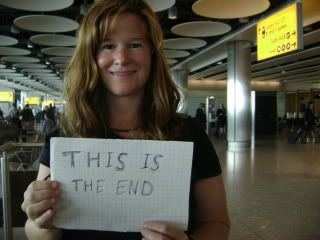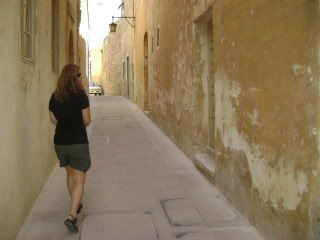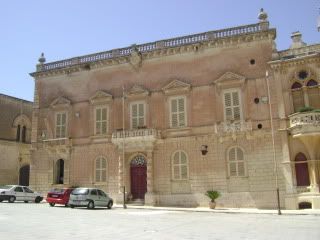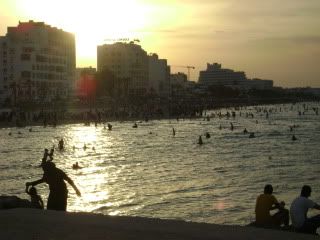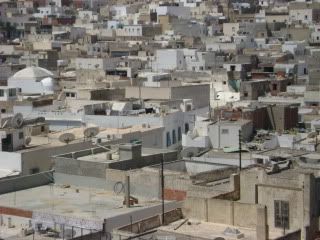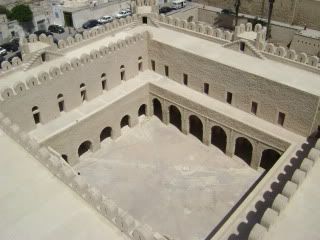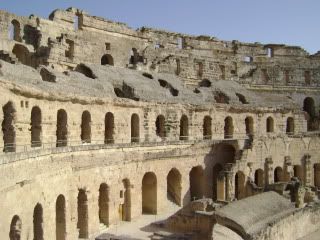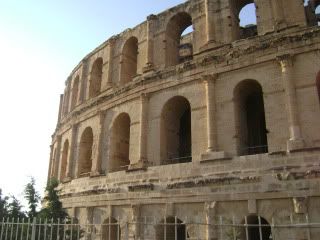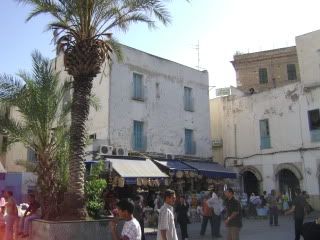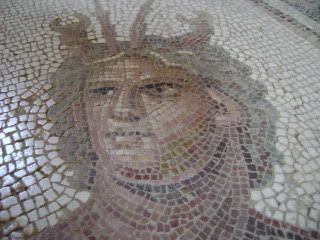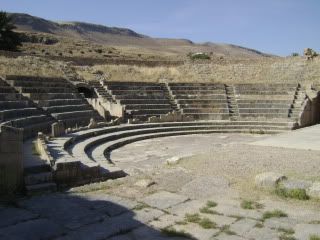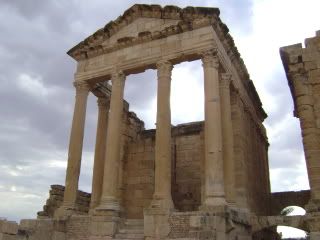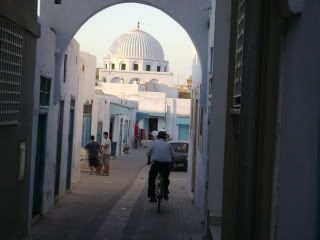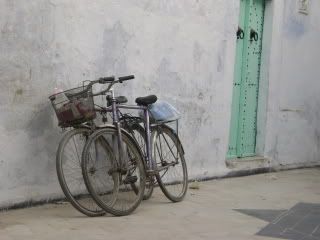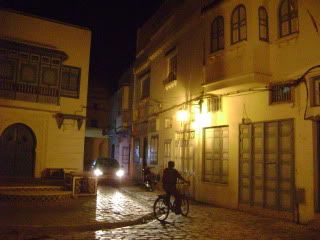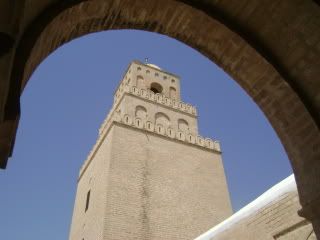(Mdina, Malta)
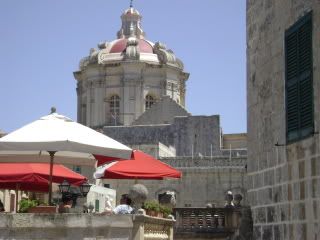
On our last day we checked out of the Harbor View Hotel to move to the Asti Guesthouse. The Harbor View was spectacular; we had a balcony with a view of the busy seaport and the city's fortifications, which were floodlit at night. But the rooom was $65 a night. The Asti was just $50 a night, and the $15 saved meant a lot to us. But in return for our savings we got a view of an apartment, a stingy breakfast, a room hot like an oven, cold water in the shared showers and an ancient innkeeper who defined the word surly.
(Mosta)
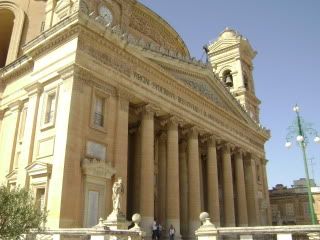
How much we spent on things was a big deal on this trip. I kept a daily running of every dollar, omani and bhat we spent on this trip, and regularly totalled the spendings up into a running average. We kept the trip generally on budget. In all, we travelled for $43 per person per day, a figure which includes the short hop airfares we picked up along the way but not our round-the-world plane tickets we bought. I'm proud of the $43 figure -- we saw a lot on little money, and generally ate, travelled and slept in comfort, much more comfort than on our last trip. You find a lot of resistance in the world when you decide to do things independently and on a budget; keeping expenditures in reign was an often daunting task.
(Valletta, where business seemed to be on permanent siesta)
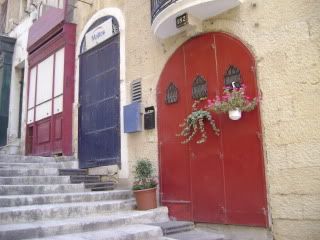
On Wednesday we checked out of the Asti, went to the beach one last time, then boarded a British Airways flight for London Gatwick. We arrived at Gatwick late and walked along a busy road to our hotel. In the morning we went back to Gatwick and after much debate, misunderstandings and confusion got a train to Victoria Station and then the tube to London Heathrow. I had hoped to see some of London but the time and expense in transferring between the two airports meant we only had time to grab a bagel before heading on to Heathrow. After trooping all across the Third World for 12 months, the First World proved to be surprisingly difficult, expensive and frustrating. British Air took us on a plane crowded with screaming babies to Atlanta, where we arrived Thursday night. We took MARTA to Decatur, where Laura's parents picked us up, and like that our trip around the world came to an end.
(Mdina)
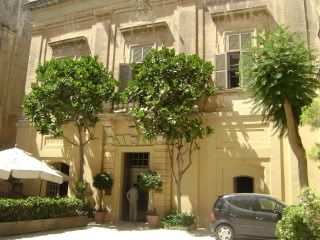
We have now travelled around the world twice. Our world is an amazing place full of color and diversity and hardship and sadness. Sitting here in Laura's parent's house in Atlanta it's hard to believe that just a few days ago we were bumping along the north coast road in Malta headed to another beach. It's hard, too, to believe that at this very moment a packed louage is making the run between Sousse and Tunis, that ringtailed lemurs are jumping tree to tree in a national park in Madagascar's rainforest, that it is a steamy night in Vientiane with the sky lit by faroff lightning, that Tasmania, which we had seen in the height of summer, is now in the depth of winter, that a jet is circling Quito on the run in from Santiago. It's all out there, vivid as life.
(Floriana)
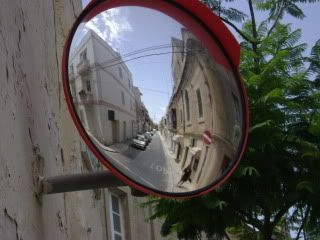
Having been around the world twice I've noticed that there are some areas of the world where improvement is needed. In fact, many of the problems in any one particular nation are also shared by most other countries. There's a lot of opportunity there for people who want to make a difference:
*Simple health: The leading causes of death in many of the world's nations are easily preventable illnesses, like diarrhea. Simple health education and practices -- things we take for granted but which elude many of the world's residents -- can go a long way toward making lives better.
*Water quality: Perhaps the most disheartening thing I have seen on this trip is the worldwide problem of polluted waterways. Almost without exception, when you see a body of fresh water almost anywhere in the world, it's bound to have trash, fuel or human waste in it. Mostly, pollution to fresh water appears to come from a lack of regular trash pickup and a lack of education.
*Trash collection: Most places in the world lack regular trash pickup. Trash is often burned, often left in city streets, and always present.
*City planning: In many places, particularly Asia and South America, large cities come close to approximating hell on earth. There are myriad reasons for this -- overcrowding, poor trash collection, loose or nonexistant regulation. Many of these problems, I believe could be solved by assistance in city planning and implementation of even basic smart growth principles.
*Driver education: It's common in the US to say that the drivers of a particular city are awful. But you haven't seen anything until you've witnessed driving in, say, Peru. A license in many places is granted to those who can pay for it, not those whom have passed any sort of proficiency test. This fact exacerbates the hard lives many people already lead, and causes untold suffering and grief.
*Global warming: It seems hard to believe there are still people out there who do not believe in global warming. We've seen it and seen its effects. It's changing landscapes, habitats and nations themselves.
(Mdina)
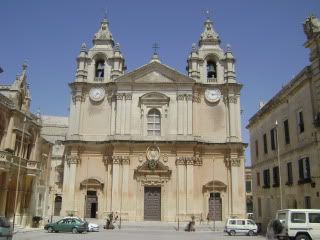
Our last day in Malta was a hot one. With an hour to kill before going to the airport we went to the city's south fort, which overlooks the harbor and catches a cool breeze. Sitting on a bench, I noticed the man next to me reading a Bible in Amharic, the ancient language of Ethiopia. I struck up a conversation with him. Renyu Sigiwi was in fact a former resident of Eritrea, and he willingly told me his story. Five years ago, with his wife pregnant and Eritrea slipping into chaos, Renyu snuck over the border to Sudan. In Kartoum he spent three months seeking a work visa for Italy. When that plan deadended he boarded a crowded LandCruiser which drove over the desert to Libya. He spent three weeks in Tripoli before boarding a 16-foot boat early one Saturday morning and heading north. On day two the boat ran out of food and water. On day three it ran out of fuel. Adrift in the Mediterranean, someone on the boat made a distress call to the Italian maritime authorities, seeking rescue for the boat's 28 occupants. But the call was dropped uncompleted -- the phone ran out of minutes. A few hours later the passengers were picked up by the Maltese coast guard -- help from a quarter they neither wanted no expected. Renyu was detained for 28 days while authorities determined his identity and immigrant status. He was eventually granted refugee status and given accommodations and a job as a welder. Four years later, he learned he has just been granted a permanent visa for the US as part of a program to ease the immigrant crush on small nations like Malta. He will go to Houston, where after some initial assistance he will be left to fend for his self. He told me he plans to bring his wife and daughter -- whom he has never seen -- to Houston once he is settled there. He added the newcomers wil stay in the US -- illegallly.
(View from the Harbor View Hotel)
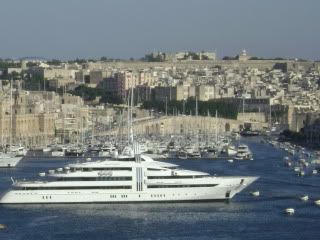
With the sun lowering over the Valletta port, Renyu held up his Amharic Bible and told me its impact on his life. Your walk with God is like a vacation, he said. You never know where it will lead you, but you always have to be ready for where you go. So there you are. The world is crawling with travelers seeking a new experience or a new life. Maybe we'll always be traveling, even when we're not going anywhere. It's just that the scenery is different. It's weird being back in the US. Our first morning back I woke up early, still on Maltese time, and turned the TV on. Do you know what is on TV at 5 am? Infomercials for back pain solutions, weight loss exercises and personal injury lawyers. No, now we have found the truly exotic place in the world, I thought, the place where everything is strange and weird. Am I glad to be back? I don't know. But I can tell you it's definitely over.
